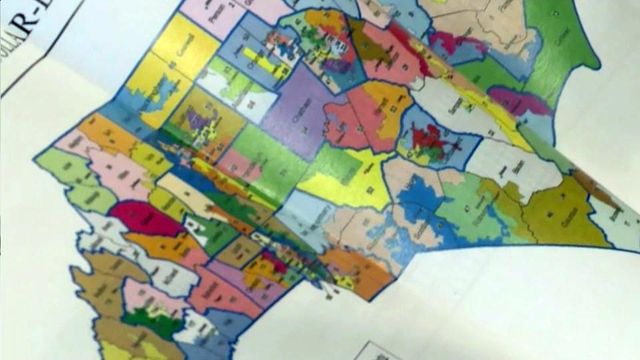Plaintiffs ask court to speed up new NC voting maps
Plaintiffs who successfully challenged the legality of North Carolina's legislative districts are asking federal judges to require lawmakers to draw new maps by Aug. 11 and to hold new elections in March, before the next regularly scheduled session of the General Assembly.
Posted — UpdatedThose arguments are part of the latest filing in the Covington v. North Carolina case, scheduled for a hearing Thursday in a federal courtroom in Greensboro. The three-judge panel that declared the maps unconstitutional last year and ordered lawmakers to draw new ones will now hear arguments about how quickly the process should happen.
Attorneys representing the state and legislative leaders have proposed a Nov. 15 deadline to pass new state House and Senate districts and submit them to the court for review. They argue that the process is required to include public hearings and feedback.
"I think they’re asking for something that’s going to be politically difficult for the courts to meet," said David McLennan, a political science professor at Meredith College, noting the plaintiffs' request would entail the state conducting five elections – two primaries and three general elections – in a 12-month period.
"As a political statement, it makes perfect sense," McLennan said of the plaintiff's motion. "I just think, in terms of both how the justices will interpret the law and then just sort of the speed at which we’d have to have a primary, a general election and then another primary and general election, it would almost be untenable."
Legislative leaders countered that past legislatures have continued their work despite such rulings, although precedent is mixed.
In April 2002, when the state Supreme Court threw out maps drawn by Democratic leaders, lawmakers held a special session to redraw districts before beginning their short session in May. However, in July 2003, when the court threw out those 2002 maps, the legislature continued its session, not redrawing the maps till November.
The legislature has the legal right to the first attempt to fix its own maps, the motion says, and the federal court can grant it the power to do so. But any other action, they suggest, would be legally dubious.
An exhibit filed with the motion offers an example of how that could play out.
That bill is one of a half-dozen that lawmakers are expected to reconsider in their veto override session Aug. 3.
Carter argues, as Speas and Earls did in their motion, that the issuance of the Supreme Court's mandate to the state on June 30 removes the body's authority to legislate or override a veto.
"If the usurper legislature does attempt to override the veto," Carter wrote in the letter dated Friday, "it opens itself up to litigation wherein the North Carolina State Courts may be asked to issue a declaratory judgment that the law is facially unconstitutional and void ab initio."
WRAL News asked legislative leaders for their response to this argument.
Answering on behalf of Senate Redistricting Chairman Sen. Ralph Hise, R-Mitchell, spokeswoman Shelly Carver replied, "We will respond to the plaintiffs in court at the hearing on Thursday."
"In general, the legal principle of good faith is applied," McLennan said. "If you’re elected with the maps, then you were elected in good faith, and therefore, you legislate in good faith. To void any kind of action, even though the courts have said the maps themselves are unconstitutional, nowhere in the country have I ever seen that happen."
Related Topics
• Credits
Copyright 2024 by Capitol Broadcasting Company. All rights reserved. This material may not be published, broadcast, rewritten or redistributed.






